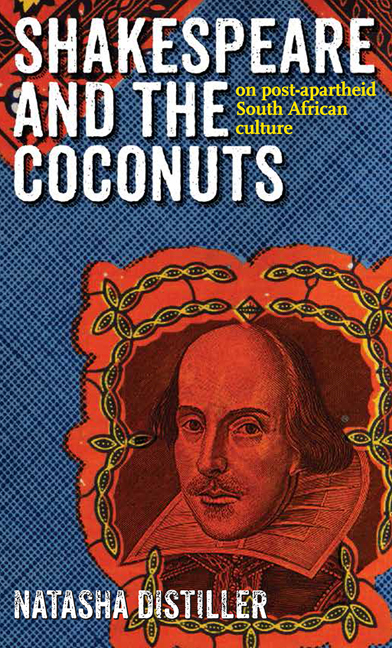Book contents
- Frontmatter
- Contents
- Acknowledgements
- Introduction
- Chapter 1 Shakespeare in English, English in South Africa
- Chapter 2 ‘Through Shakespeare's Africa’: ‘Terror and murder’?
- Chapter 3 Tony's Will: Titus Andronicus in South Africa, 1995
- Chapter 4 Begging the questions: Producing Shakespeare for post-apartheid South African schools
- Chapter 5 English and the African Renaissance
- Chapter 6 Shakespeare and the coconuts
- Endnotes
- Bibliography
- Index
Chapter 1 - Shakespeare in English, English in South Africa
Published online by Cambridge University Press: 21 April 2018
- Frontmatter
- Contents
- Acknowledgements
- Introduction
- Chapter 1 Shakespeare in English, English in South Africa
- Chapter 2 ‘Through Shakespeare's Africa’: ‘Terror and murder’?
- Chapter 3 Tony's Will: Titus Andronicus in South Africa, 1995
- Chapter 4 Begging the questions: Producing Shakespeare for post-apartheid South African schools
- Chapter 5 English and the African Renaissance
- Chapter 6 Shakespeare and the coconuts
- Endnotes
- Bibliography
- Index
Summary
In her 2007 European Union Literary Award-winning first novel, Kopana Matlwa presents an engaged critique of the primacy of English in the ‘new’ South Africa. Coconut is the story of two young women, Ofilwe and Fikile. The former is part of the emerging black middle class, and has ‘lost’ her culture for an Englished identity in a world of ‘white’ privilege that will never truly accept or know her. Eating with her family at an otherwise whites-only restaurant, she thinks,
We dare not eat with our naked fingertips, walk in generous groups, speak merrily in booming voices … They will scold us if we dare, not with their lips … because the laws prevent them from doing so, but with their eyes. They will shout, ‘Stop acting black!’
The latter is desperate to acquire the glamour and power of whiteness in order to escape the poverty and deprivation she sees as intrinsically ‘black’:
‘And you, Fikile, what do you want to be when you grow up?’
‘White, teacher Zola. I want to be white.’ …
‘But Fikile dea r… why would you want to do that …?’
‘Because it's better.’
‘What makes you think that, Fikile?’
‘Everything.’
Part of acquiring whiteness and the class advancement that goes with it is acquiring English, and with it an implictly Anglo- American culture which is relentlessly ‘white’. This is Ofilwe's ironic ABC:
After-Sun. Bikini. Ballet. Barbie and Ken. Cruise. Disneyland. Disco. Diamonds and Pearls. Easter Egg. Fettucine. Frappe. Fork and Knife. Gymnastics. Horse Riding. Horticulture. House in the Hills. Indoor Cricket. Jungle Gym. Jacuzzi. Jumping Jacks and Flip Flacks. Khaki. Lock. Loiter. Looks like Trouble. Maid. Native. Nameless.
No, not me, Madam. Napoleon. Ocean. Overthrow. Occupy and Rule. Palace. Quantity. Quantify. Queen of England. Red. Sunscreen. Suntan. Sex on the Beach. Tinkerbell. Unicorn. Oopsy daisy. Unwrap them all at once! Video Games. World Wide Web. Wireless Connection. Xmas. Yo-yo Diet. You, You and You. Zero guilt.
Matlwa's novel is an attack on ongoing systemic racism and its links to what the book sees as the power bloc that is whiteness and Englishness: the two are inseparable.
- Type
- Chapter
- Information
- Shakespeare and the Coconutson post-apartheid South African culture, pp. 19 - 48Publisher: Wits University PressPrint publication year: 2012

